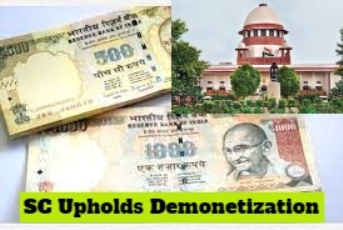

By Our Editorial Team
First publised on 2023-01-03 06:41:17
The Supreme Court upheld the constitutional validity of 2016 demonetization in a split (4-1) verdict. The majority judgment of the 5-member Constitutional bench, delivered by Justice B R Gavai, held that economic policies were the exclusive domain of the executive and regardless of the fact whether the stated objectives of the policy were met or not, the judiciary cannot interfere in the process if the procedure followed to implement the policy was not unlawful. It held that the Centre consulted the RBI in a correct manner before implementing the policy. It also held that the 52-day window granted to exchange demonetized currency was reasonable and no fresh window can be granted. The dissenting judgment came from Justice B V Nagarathna who held that although the government 'consulted' the RBI, it just sought its 'advice' and the RBI did not 'recommend' demonetization for there was no independent application of mind by the apex bank. That, according to Justice Nagarathna, violated the provisions of the RBI Act. She also ruled that the government should not have adopted the gazette notification route and should have discussed the matter in Parliament.
Although Justice Nagarathna has raised important questions about RBI's independence and its powers to recommend certain policy matters to the government, the fact remains that decisions like demonetization as an economic policy will always be taken by the Centre. The main points of criticism of demonetization - that it did not achieve its stated objectives, that it caused immense hardships to the people and that it did not reduce cash in the economy (which has in fact now ballooned to twice the quantum it was before demonetization) were not the questions before the Supreme Court. Its brief was to examine whether the government had failed to follow legal procedure in implementing the policy or whether the decision was arbitrary. On both counts, the majority view was that there was nothing amiss. With this verdict, a judicial closure has been achieved for the 2016 demonetization. But hopefully, the government has learnt its lessons and henceforth, economic policies that impact almost the entire citizenry or have grave consequences for the economy will be implemented in a better and more thoughtful manner and with greater empathy.











